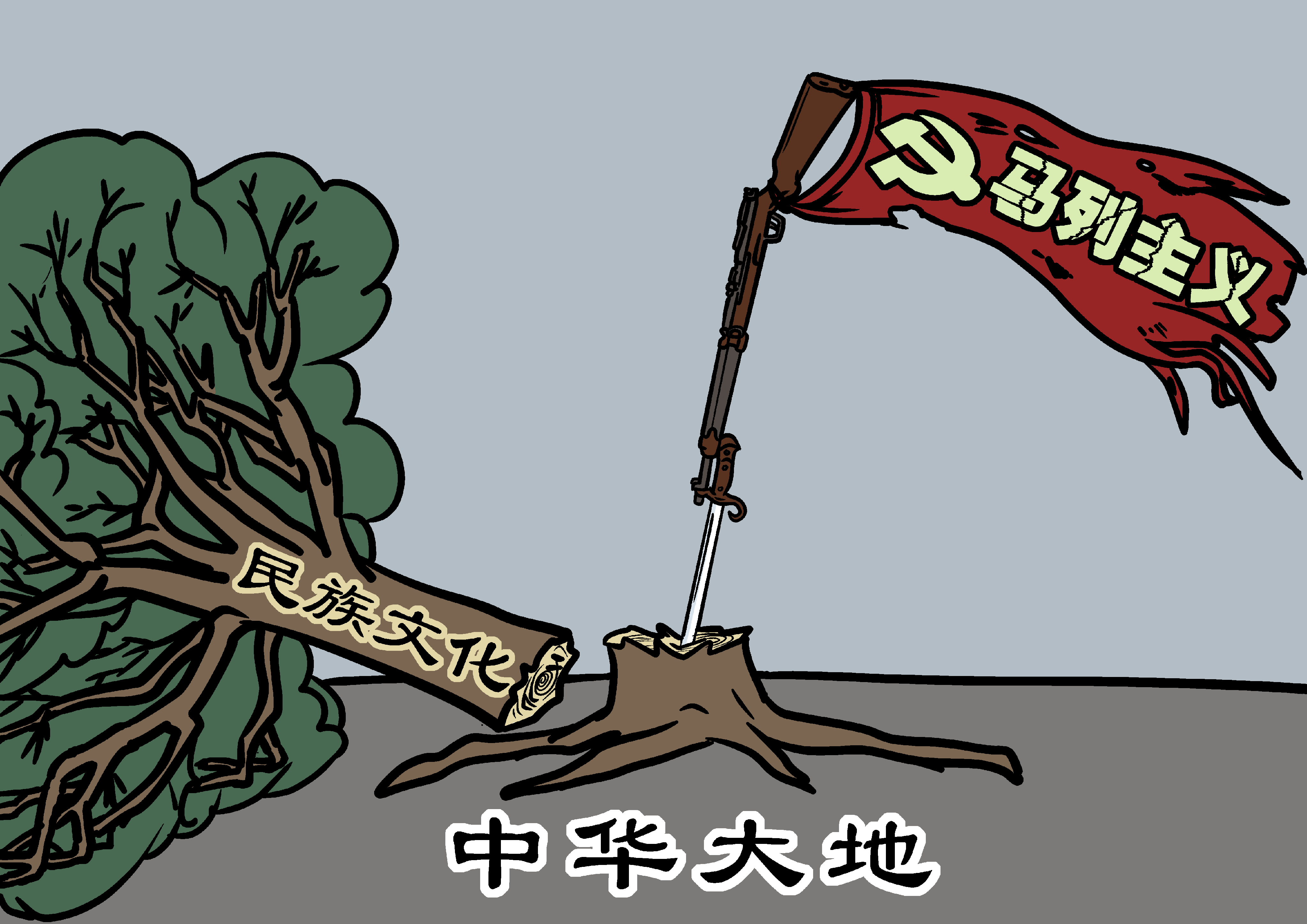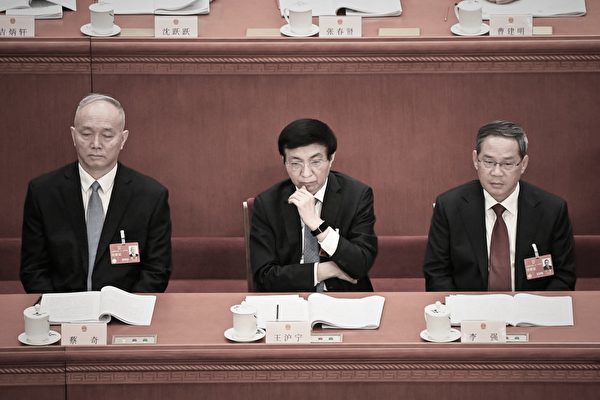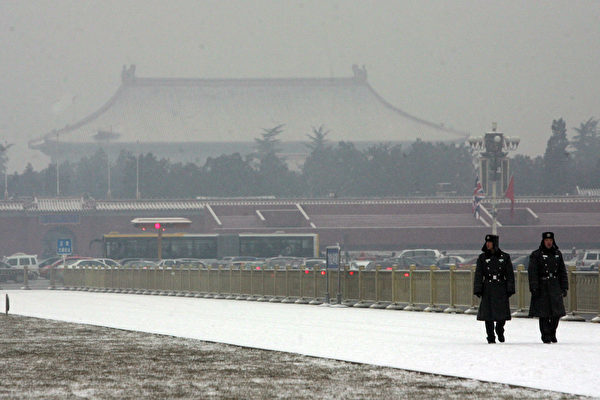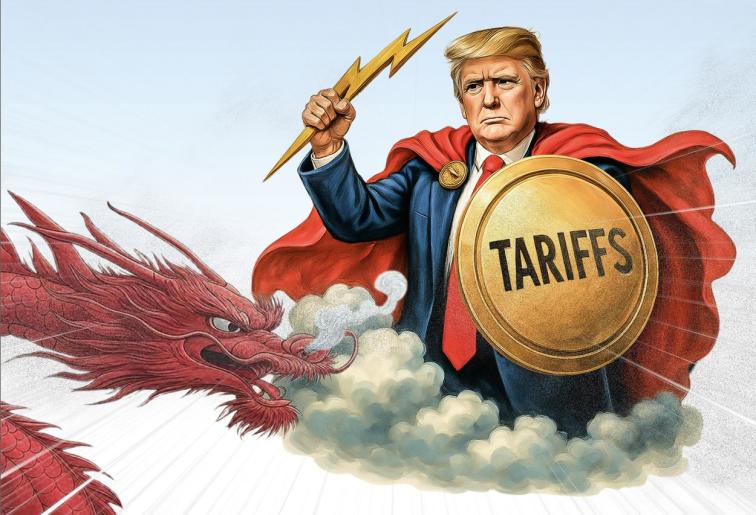(Illustration provided by Dajiyuan)
[People News] By 2025, Xi Jinping will have been in power for 13 years. From building the Xiong’an New Area in the flood-prone "Nine Rivers Basin," to pushing China–U.S. relations to their lowest point since diplomatic normalization over 40 years ago; from amending the constitutional term limits for the presidency, to effectively supporting Russia's invasion of Ukraine; from three years of extreme “Zero-COVID” lockdowns, to aggressive “Wolf Warrior” diplomacy that has provoked international backlash—Xi has left both domestic and foreign policy in chaos. Today, he finds himself in a near "everyone pushes the falling wall" situation.
In April last year, Xi’s top military confidant—Zhong Shaojun, director of the General Office of the Central Military Commission and director of the Chairman’s Office—was removed. Since then, Xi’s military allies have been removed or investigated one after another.
To date, Xi’s closest military ally—Politburo member and Vice Chairman of the Central Military Commission, He Weidong—and his second-in-command in the military—Military Commission member and head of the Political Work Department, Miao Hua—have both fallen. This means Xi’s left and right arms in the military have been broken, and his control of the armed forces has effectively collapsed.
Military power is Xi’s political lifeline. Without it, his fall from power is not far off.
Why have Xi’s 13 years in office led to a dead end in both domestic and foreign affairs, and to the point of losing military control and being on the verge of stepping down?
Shocking Reality
This year marks the 26th year of the Chinese Communist Party's (CCP) ongoing persecution of Falun Gong. Under Xi Jinping’s rule, this persecution has continued unabated for 13 years.
Falun Gong, also known as Falun Dafa, is a high-level Buddhist spiritual practice introduced by Mr. Li Hongzhi in Changchun, Northeast China, on May 13, 1992. Based on the universal principles of Truthfulness, Compassion, and Forbearance, it consists of five simple and effective exercises—four standing movements and one meditation.
Because of its profound healing effects and ability to purify the mind, Falun Gong quickly spread across all 32 provinces, autonomous regions, and municipalities in mainland China, without costing the government a single cent or requiring any coercion. It also spread to Hong Kong, Macau, Taiwan, and countries across Asia, Europe, the Americas, and Australia.
On July 20, 1999, then-CCP leader Jiang Zemin launched a brutal campaign to eradicate Falun Gong, fearing that the practice's popularity would lead the public to turn away from the Party and toward belief in Falun Gong. Ignoring voices within the government saying that “Falun Dafa only benefits the nation and people, and does no harm,” Jiang used the full force of the state to initiate the persecution.
Since taking office, Xi Jinping has maintained the CCP’s persecution policy against Falun Gong.
According to data from the Minghui.org website, I compiled preliminary statistics on the persecution from January 2013 to April 2025, during Xi’s 13 years in power. In that period, there were 130,698 instances of abductions or harassment, 11,200 illegal prison sentences, and 1,368 confirmed deaths due to persecution.
It must be noted that these numbers are incomplete, as they only include cases reported to Minghui by practitioners in China who were able to break through the regime’s information blockade. Many cases likely remain unreported.
Here is just one example: On July 19, 2020, female artist Xu Na was illegally arrested at her home by Beijing police. Despite her lawyer delivering a powerful not-guilty defence, Xu Na was sentenced on January 14, 2022, to eight years in prison and fined 20,000 yuan by Beijing’s Dongcheng District Court.
Previously, Xu Na had been sentenced twice: first in 2001, for sheltering out-of-town Falun Gong petitioners in her home (five years); and again in 2008, when she and her husband were arrested while driving home. Her husband was beaten to death in a detention centre on Lunar New Year’s Eve—just 11 days after his arrest. Xu Na was not allowed to see him before his death and was later sentenced to three more years in prison.
In recent years, the regime has also escalated its persecution of Falun Gong overseas.
On December 6, 2024, The Epoch Times published a report titled “Xi Personally Planned a New Strategy to Attack Falun Gong Before the 20th Party Congress.” The report cited exiled legal scholar Yuan Hongbing, who said Xi personally directed a transnational crackdown on Falun Gong: The campaign was coordinated by the Central Political and Legal Affairs Commission, led by the Ministry of State Security, and supported by the Foreign Ministry and the United Front Work Department. It involved launching legal and propaganda warfare against Falun Gong overseas.
For example, Chen Jun—a so-called “community leader” in Los Angeles who boasted that “Xi Jinping personally met with me three times in ten years”—attempted to bribe U.S. tax officials to report Falun Gong for alleged violations in an effort to “bring it down.” However, Chen was sentenced by the U.S. District Court for the Southern District of New York to 20 months in prison, three years of supervised release, and a $50,000 fine.
Xi Refused to Hear the Truth or Accept Good Advice
Since Xi came to power, Falun Gong practitioners at home and abroad have continually tried to clarify the truth about Falun Gong and the persecution to him, urging him to stop the persecution for the sake of himself, his family, and future generations.
Speaking for myself: I’ve been in the U.S. for ten years and have spent all ten trying to clarify the truth to Xi. “Painstaking,” “mentally exhausting,” and “utterly devoted” barely begin to describe the effort.
Every time I wrote a letter or an article urging Xi to do good, it was extremely difficult. If I spoke too mildly, I feared it would have no impact; if too harshly, I feared he wouldn’t be able to accept it. Sometimes, I would rack my brain just to find the right words.
From Xi’s second term onward, he began turning a good hand into a losing one. More and more people, at home and abroad, began to criticise and oppose him. As time went on, criticism of Xi became almost unanimous. Because I wanted to clarify the truth to Xi, I refrained from attacking him—yet I was criticised and insulted for doing so.
I considered that Xi was not the one who initiated the persecution of Falun Gong or the organ harvesting crimes, and that his father, Xi Zhongxun, was not only a devout believer in Buddhism but also a supporter of China’s qigong movement. Xi Zhongxun had been persecuted three times in his life and taught his children, “Offer help in times of need.” So, in my appeals to Xi, I deliberately distinguished him from Jiang Zemin, hoping Xi would not become Jiang’s scapegoat but instead choose to do good.
Xi once said, “Three feet above the head are divine beings. One must have reverence.”
This shows that he once had some belief in the divine. I emphasised this point in my letters and repeatedly urged him not to persecute Falun Gong practitioners who revere divine principles.
China has long been called “the Divine Land.” Traditional Chinese culture is known as “divinely inspired culture,” and our ancestors believed in the divine. They taught us: only by respecting Heaven, revering divine beings, and following truth and morality can we be blessed and protected.
But Xi not only refused to listen, refused to stop, he personally “planned and directed” the overseas escalation of the persecution.
Xi Knows Jiang Zemin’s Crimes, But Refuses to Bring Him to Justice
Jiang Zemin is the chief culprit behind the persecution of Falun Gong. He committed at least three major crimes:
1. Jiang was the ultimate political protector of the most corrupt officials in the Party.
On July 20, 1999, when Jiang Zemin launched the persecution of Falun Gong, he was full of confidence. Believing that he held the highest authority in the Chinese Communist Party—over the Party, the government, and the military—he thought he could eradicate Falun Gong in a very short time. Jiang had total control of the “gun barrel” (military power), the “knife handle” (police and judicial power), the “pen” (propaganda apparatus), and the “money bag” (state finances and treasury).
But what Jiang never expected was that no matter what he did, he could not crush Falun Gong.
When he was at a complete loss, Jiang came up with a crooked tactic: as long as an official followed him in persecuting Falun Gong, no matter how corrupt that official was, Jiang would promote and favour them. In fact, the more corrupt the official, the more Jiang promoted them. As a result, Jiang elevated a large number of severely corrupt officials. He also encouraged his son, Jiang Mianheng, to climb the ranks while engaging in business, allowing him to gain both power and wealth simultaneously.
Under the influence and leadership of Jiang Zemin, his son, and the large number of severely corrupt officials whom Jiang had promoted and empowered, the Chinese Communist Party's officialdom quickly degenerated into a massive marketplace for power, money, and sex trades. Even the highest-ranking monk in the CCP system, Shi Xuecheng, President of the Buddhist Association of China, became a greedy and lecherous “flower monk” (a derogatory term for a monk who violates religious vows of celibacy and integrity).
When Xi came to power in 2012, he launched an anti-corruption campaign in order to wrest power from Jiang and Zeng Qinghong. In Xi’s first term, 440 senior officials (vice-ministerial and above) were taken down. Most were Jiang and Zeng’s people.
This shows clearly that Jiang and Zeng were the ultimate backers of the Party’s most corrupt officials.
2. Jiang Zemin Was the Biggest Traitor in Contemporary China and the World
Xi Jinping once said, “Not an inch of territory left by our ancestors can be lost.”
But the land Jiang Zemin gave away wasn’t an inch, a hundred inches, or even ten thousand—it was over 1 million square kilometres.
On December 9, 1999, Jiang signed the “Agreement on the Eastern and Western Sections of the China-Russia Border” with Russian President Boris Yeltsin, completely recognising a series of unequal treaties signed between the corrupt Qing dynasty and Tsarist Russia. In doing so, Jiang unconditionally ceded over 1 million square kilometres of territory in Northeast China to Russia. In July 2001, Jiang and Russian President Putin decided to split control of the Heixiazi (Bolshoi Ussuriysky) Island, giving half of this strategic island to Russia. Jiang also signed border agreements with countries like Tajikistan, ceding hundreds of thousands of square kilometres of territory in Northwest China to Central Asian states. Furthermore, parts of the Yunnan Laoshan, Zheyinshan, and Faka Mountain in Guangxi—hills soaked with the blood of Chinese soldiers—were handed over to Vietnam. The largest island in the South China Sea, Bailongwei Island, was also unconditionally given away.
Judging by these facts, it is completely fair to say: Jiang Zemin was the biggest traitor in modern China and the entire world.
The whole world knows about Jiang’s treachery.
On March 28, 2014, German Chancellor Angela Merkel, during a private dinner with Xi Jinping and his wife at the German Chancellery, presented Xi with a very special gift. Merkel said, “This is the first accurate map of China, drawn by Germans in 1735.” That year, 1735, was during the reign of Emperor Qianlong of the Qing dynasty. The map showed that China’s territory covered 13 million square kilometres.
Merkel’s gesture was a subtle and symbolic way to remind Xi: Germany knows about Jiang Zemin’s betrayal.
3. Jiang Zemin Was the Mastermind Behind Large-Scale Live Organ Harvesting from Falun Gong Practitioners
To eliminate Falun Gong, Jiang Zemin employed every method imaginable. The most evil and inhumane of these was using live organ harvesting to kill.
Since the horrific practice of harvesting organs from living Falun Gong practitioners was first exposed internationally in 2006, numerous foreign experts—including scholars, doctors, lawyers, journalists, and NGOs such as the World Organisation to Investigate the Persecution of Falun Gong (WOIPFG)—have conducted independent investigations.
On June 22, 2016, former Canadian Secretary of State for Asia-Pacific David Kilgour, international human rights lawyer David Matas, and American independent journalist Ethan Gutmann jointly released a 680-page investigative report at the National Press Club in Washington, D.C., titled:
“Bloody Harvest/The Slaughter: An Update.”
In that report, they estimated that China conducts 60,000–100,000 organ transplant surgeries per year, and that from 2000 to 2016, the total may have reached 1.5 million cases, with Falun Gong practitioners being the primary source of organs.
David Matas stated: “Over 2,200 footnotes in our report come directly from CCP data.”
In September 2014, WOIPFG released a recorded phone investigation in which Bai Shuzhong, then head of the Health Department of the PLA General Logistics Department, confirmed that Jiang Zemin personally gave the order to harvest organs from Falun Gong practitioners.
The Jiang Zemin–Zeng Qinghong faction, known as the “Blood Debt Gang” for persecuting Falun Gong, used massive-scale live organ harvesting to kill. This act has been labelled “a new form of evil on this planet never before seen”, comparable in horror only to Hitler’s genocide of the Jews in the 1930s.
Each of Jiang Zemin’s Three Crimes—Betraying the Country, Creating Mass Corruption, and Live Organ Harvesting—is a Capital offence.
These truths, including the ones I have recounted here, have been clearly and thoroughly conveyed to Xi Jinping by Falun Gong practitioners, myself included.
Yet despite knowing that Jiang committed heinous crimes against China, the Chinese people, and the Chinese nation, Xi not only refused to hold Jiang accountable, he even lavishly praised him after his death.
The eulogy Xi delivered following Jiang’s death stands as written proof that Xi willingly took on Jiang’s three great “black burdens.”
The Fundamental Reason Xi's Domestic and Foreign Policies Have Hit a Dead End
As stated above, Falun Gong is a high-level Buddhist cultivation system guided by the universal principles of Truthfulness, Compassion, and Forbearance (Zhen, Shan, Ren).
Because of this, even though Jiang mobilised the entire state apparatus, spent vast national resources, and used the most evil, underhanded methods imaginable, he could not defeat Falun Gong. Today, not only does Falun Gong remain standing, but it has spread to more than 110 countries and regions around the world.
Falun Gong practitioners adhere to Truthfulness, Compassion, and Forbearance. Therefore, the persecution must be based on the opposite: Falsehood, Evil, and Struggle.
The CCP persecuted Falun Gong for 13 years before Xi came to power. After Xi took over, the persecution continued for another 13 years. That means the CCP has spent 26 years promoting "Falsehood, Evil, and Struggle" throughout China and around the world.
This is the fundamental reason why Xi’s domestic and foreign policies have ended up at a dead end.
Conclusion
Why has Xi reached this point today? The most critical reason is: He has never understood why Jiang Zemin and the CCP chose to oppose “Truthfulness, Compassion, and Forbearance.”
On April 25, 1999, in a letter to the CCP Politburo Standing Committee, Jiang Zemin wrote: “I don’t believe that Marxism can not defeat Falun Gong.”
But after 26 years of using every dirty trick known to history—ancient and modern, Chinese and foreign—Falun Gong still hasn’t been defeated. That proves one thing: Marxism truly cannot defeat Falun Gong.
Why?
Because the essence of Marxism, no matter how lofty its rhetoric, is fundamentally opposed to Truthfulness, Compassion, and Forbearance. Its core is Falsehood, Evil, and Struggle.
(This article was originally published by Dajiyuan.)











News magazine bootstrap themes!
I like this themes, fast loading and look profesional
Thank you Carlos!
You're welcome!
Please support me with give positive rating!
Yes Sure!